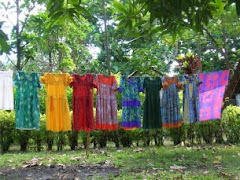Today we had another Health Committee meeting to focus on the final details of the Helt Program (health program) that the committee and I have created.
From the household surveys that I did with every family there was an overwhelming number (almost 100%) that expressed they needed an alternative to the costly kerosene lantern. As well many other issues became apparent from doing the survey such as a lack of health education with the adults.
I knew of an alternative solar powered lantern (D.Light) that sells in Vila for about $60, but I didn’t know how to incorporate everything into a project.
But with some encouragement and help from family and friends the “Give Light & Help Make a Brighter Future” Health Program came about.
The health survey of 47 households gave me and the health committee a lot of valuable information to help design a program that addresses some of the lack of knowledge and good health practices of the people.
The following are some of the statistical results from the survey: Hand washing is not a high priority as most reported that they occasionally will wash before cooking or eating. 66 % throw their trash in the bushes and burn it. Only 16% of young girls and women use some form of family planning and 57% could not name one sexually transmitted infection. 42% think that people get sick because of black magic.
At present there are only four homes that use solar lighting and the rest rely on kerosene lanterns and battery operated flashlights. One family will typically use 2 bottles (about a total of 24 ounces) a week at a total cost of 200 vt ($2) and 10,400 vt ($104) for the year. Batteries are costly as well at 100 vt ($1) per battery. Another disadvantage is due to the limited shipments arriving to the island there are frequent shortages of kerosene and batteries and families must resort back to making candles with coconut oil or be in bed by 7pm.
There are few paying jobs available on the island and all 10 positions are provided through the health facility and school. Most families depend on selling crops, mats and small animals on Tongariki and in the capital city (for example a chicken fetches 500 vt ($5) or a mat will fetch 500-1,000 vt ($5-10) for 1-2 days of weaving). Many families find it difficult to provide even the basic necessities such as clothes and school fees for their family.
The Health Program won’t just give solar lanterns to the 73 families on Tongariki but each family will participate in a program in increase their knowledge and encourage better health practices. The adults in each family will attend 6 health talks that I will give with the aid of Shelly and Pastor Rueban on: hygiene, common illnesses, first aid, HIV/AIDS + STIs, family planning and non-communicable diseases. Also, each household will need to have a trash pit for all non-degradable items and a place to wash your hands outside of their toilet.
Thursday, April 8, 2010
Subscribe to:
Comments (Atom)



